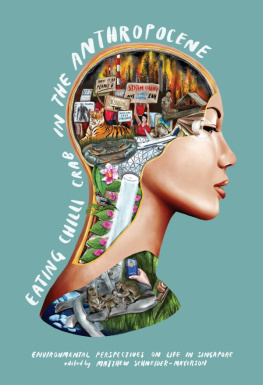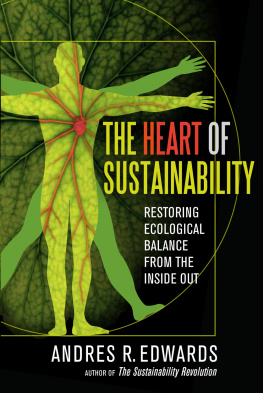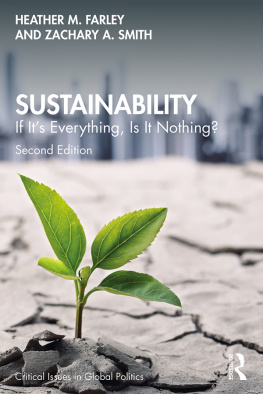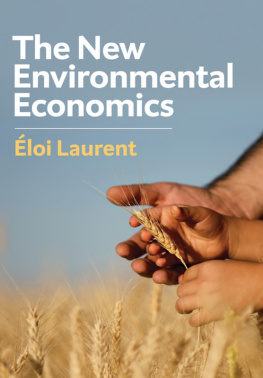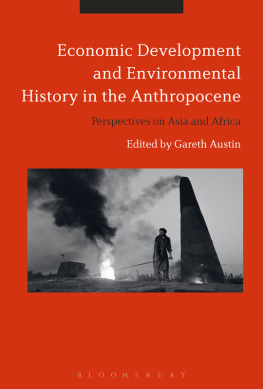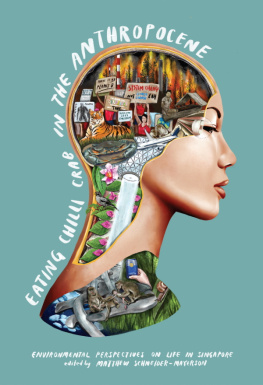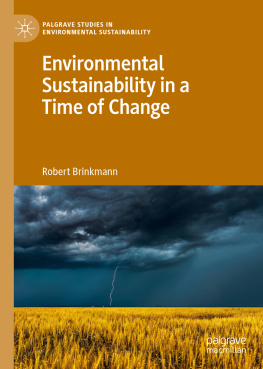This e-book is licensed for your personal enjoyment only. If you would like to share this book with another person, please purchase an additional copy for each person you share it with.
If youre reading this book and did not purchase it, or it was not purchased for your use only, please consider getting your own copy from ethosbooks.com.sg. Thank you for respecting the hard work of this author.
From paleo-anthropology to culinary culture; animism to activism to animal rights; displaced societies to invasive species to unsustainable icons; Singapore will be transformed after you read these exciting explorations into her past, present and future. Diverse dots are connected, silos deconstructed, sacred cows challenged and eloquent voice given to the forgotten, marginalised, ignored, hidden or unspoken. If leadership means influencing the community to face its problems these writers are our leaders for a sustainable future.
Geh Min, Immediate Past President, Nature Society Singapore
and former Nominated Member of Parliament
Read this book and become inspired by the feisty intellect and elegant writing of Singapores climate generation. These emerging scholars write with a sense of urgency, mobilising their impressive literary and scholarly talents to command our attention. Their essays reorient our values, priorities and politics, demanding that we recognise the ethical responsibilities we have to the multispecies world we live in. As they analyse the entanglements of humans and nature in one of the worlds most technology obsessed cities, their voices offer a glimmer of hope for the future of Singapore and other cities in the Anthropocene. As the brilliant introduction notes: Everything is environmental Even Singapore! The city is an environment where diverse biological life teems alongside a new generation of inspiring thinkers. Listen to them as they rethink the ethical demands of a world where the life we celebrate is not simply human but biological.
Erik Harms, Associate Professor of Anthropology and
Southeast Asia Studies, Yale University
This spirited anthology connects seemingly ordinary Singaporean subjects to larger concerns of animal rights, environmental protection or simply, how to live ethically. Written with eloquence and empathy, these youthful contributors are the reason why we are ever hopeful for a better Singapore, in a better world.
Harvey Neo, Senior Fellow and Programme Head at Lee Kuan Yew Centre
for Innovative Cities, Singapore University of Technology and Design
These thoughtful and diverse essays deserve to be read by anyone seriously interested in environmental issues in Singapore. Our youth authors raise important questions about how we have come to understand and interact with nature and the environment we live in, and offer plausible ways forward. We must listen and act now.
Melissa Low, Research Fellow, Energy Studies Institute,
National University of Singapore
Eating Chilli Crab in the Anthropocene:
Environmental Perspectives on Life in Singapore
Copyright Ethos Books, 2020
Copyrights to individual works featured in this publication are reserved by their respective authors.
ISBN 978-981-14-4136-3 (paperback)
ISBN 978-981-14-5963-4 (ebook)
Published under the imprint Ethos Books
by Pagesetters Services Pte Ltd
#06-131 Midview City
28 Sin Ming Lane
Singapore 573972
www.ethosbooks.com.sg
Ethos Books gratefully acknowledges the financial assistance provided for the publication of this book by a grant from YaleNUS College.
The publisher reserves all rights to this title.
Except for the quotation of short passages for the purpose of criticism and review, no part of this publication may be reproduced, stored in a retrieval system, or transmitted, in any form or by any means, electronic, mechanical, photocopying, recording or otherwise, without the prior written permission of the publisher.
Cover illustration by Tiffany Lovage
Design and layout by Pagesetters Services Pte Ltd
Printed by Markono Print Media Pte Ltd
1 2 3 4 5 6 24 23 22 21 20
Typefaces: Fanwood, League Spartan
Material: 80gsm Holmen Cream Bulk 2.0
National Library Board, Singapore Cataloguing in Publication Data
Name(s): Schneider-Mayerson, Matthew, editor.
Title: Eating chilli crab in the Anthropocene : environmental perspectives on life in Singapore / edited by Matthew Schneider-Mayerson.
Description: Singapore : Ethos Books, [2020]
Identifier(s): OCN 1151467393 | ISBN 978-981-14-4136-3 (paperback)
Subject(s): LCSH: Human ecology and the humanities--Singapore. | Climatic changes--Effect of human beings on--Singapore. | Nature--Effect of human beings on--Singapore. | Sustainability--Singapore.
Classification: DDC 304.2095957--dc23

Foreword
Tan Tai Yong
President, Yale-NUS College
THOUGH SINGAPORE TODAY lacks wildernessthe pristine, untouched areas we have come to associate with natureits a techno-natural wonder, a rojak laboratory of culture and hydra-headed life, and therefore an ideal place to examine the world that humans have built in this time of incredible peril, writes Dr Matthew Schneider-Mayerson in his introduction to this timely collection of essays.
Reading this, I was immediately reminded of the towering, slightly menacing-looking, man-made Supertrees at Gardens by the Bay; I was also reminded of a current exhibition at the Lee Kong Chian Natural History Museum, titled 200: A Natural History.
The exhibition publication is a fascinating document and catalogue of animals, plants, people and places that form an intricate narrative tapestry of Singapores natural history. The natural history of Singapore abounds with stories that are as remarkable as they are diverse the book blurb notes. Some discoveries are field-changing, like the only land snail that produces light. At the same time, we are also reminded of how, following the arrival of the British and the age of empire, nature came to be treated as something to be discovered, tamed, documented, exploited, commoditised and defended (against competing claims of discoveries by rival colonial powers).
Why am I recounting this? In the 1820s, Singapore was largely covered in tropical rainforest. But by the 1850s, the spread of gambier and pepper plantations on the island had led to the denuding of the rainforest. While the island was shorn of its forest cover, the Singapore Botanic Gardens was set up in 1859 as a scientific garden. The Gardens first director, who earned the nickname Mad Ridley for his enthusiastic and tireless promotion of rubber as a cash crop, is also known as the father of the rubber industry. At around the same period, Indian convicts in Singapore were summoned to take on the dangerous task of hunting down tigers, which had become a threat as the human population continued to encroach on the islands interior. In 1874, a decision was made by the Legislative Council of Singapore to establish a library and a museum. Four years later, the Raffles Library and Museum, the earliest predecessor of the Lee Kong Chian Natural History Museum, was made a legal entity.
The museums long and chequered history, including the manner in which its collection was handled in the years after independence, is in part a reflection of our uneasy relationship with nature. An unwanted orphan was how one commentator described the natural history collection. In 1974, the National Museum, which had inherited the collection, gave away to Malaysia its most iconic exhibitthe skeleton of an Indian fin whale. Natural history and by extension nature were considered dispensable, seemingly irrelevant or an afterthought to other concerns that were deemed more pressing. At best, we are reminded of the natural environment through the occasional sighting of crocodiles, wild boars, otters and hornbills.

